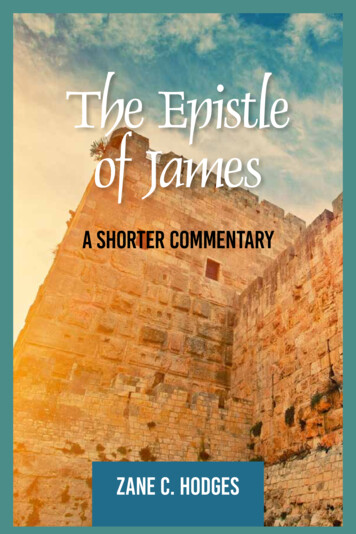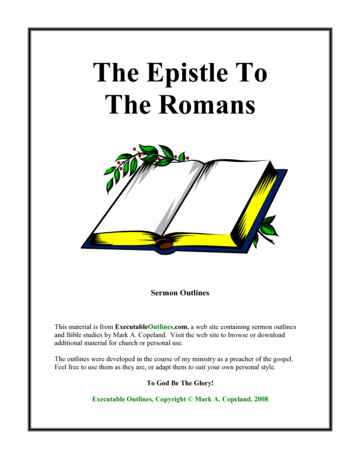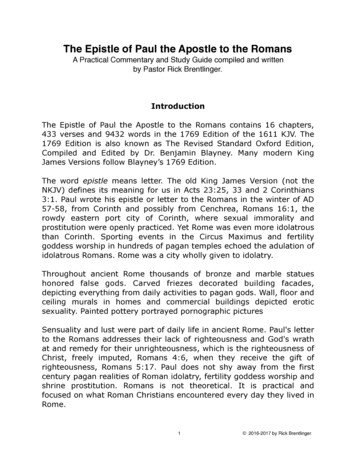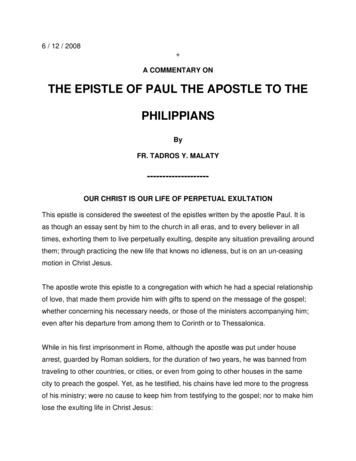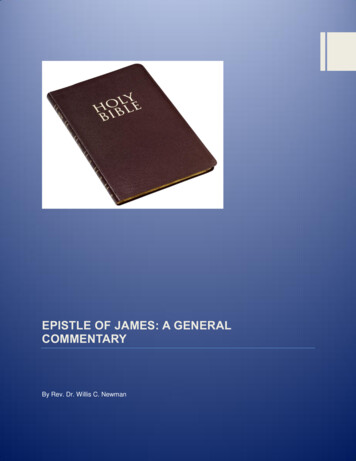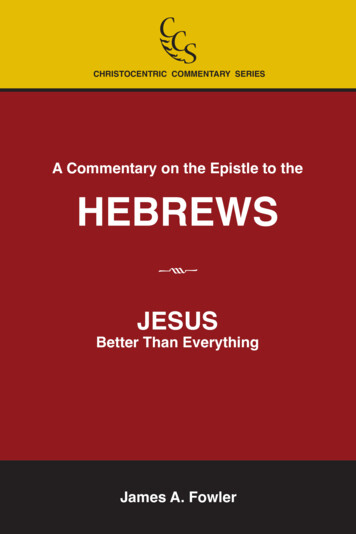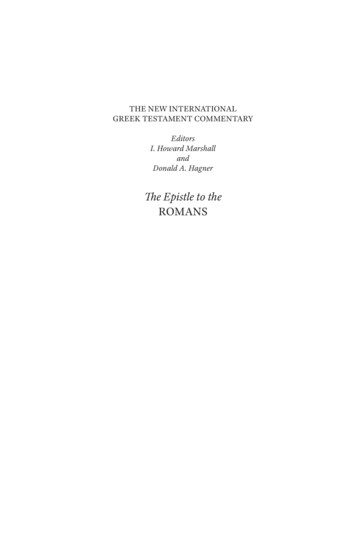
Transcription
An Exposition of the Epistle to the
Hebrews, Vol. 3by John OwenTable of ContentsCHAPTER 1Hebrews 1: 1, 2Hebrews 1:3Hebrews 1:4Hebrews 1:5Hebrews 1:6Hebrews 1:7Hebrews 1:8-9Hebrews 1: 10–12Hebrews 1: 13Hebrews 1:14CHAPTER 2Hebrews 2:1Hebrews 2: 2–4Hebrews 2: 5–9
Hebrews 2: 10Hebrews 2: 11–13Hebrews 2: 14, 15Hebrews 2: 16Hebrews 2: 17, 18CHAPTER 3Hebrews 3:1-2Hebrews 3: 3–6CHAPTER 1THE general scope and design of the apostle in this whole epistle hathbeen before declared, and need not here be repeated. In this first chapterhe fixeth and improveth the principal consideration that he intends toinsist on throughout the epistle,—to prevail with the Hebrews untoconstancy and perseverance in the doctrine of the gospel. And this istaken from the immediate author of it, the promised Messiah, the Son ofGod. Him, therefore, in this chapter he at large describes; and that twoways,—1. Absolutely, declaring what he is in his person and offices, asalso what he hath done for the church; and, 2. Comparatively, withrespect unto other ministerial revealers of the mind and will of God,especially insisting on his excellency and pre-eminence above the angels,as we shall see in the explication of the several parts and verses of it.Hebrews 1: 1, 2
Πολυμερῶς καὶ πολυτρόπως πάλαι ὁ Θεὸς λαλήσας τοῖς πατράσιν ἐν τοῖςπροφήταις, ἐπʼ ἐσχάτων τῶν ἡμερῶν τούτων ἐλάλησεν ἡμῖν ἐν Υἱῷ, ὅνἔθηκε κληρονόμον πάντων, διʼ οὗ καὶ τοὺς αἰῶνας ἐποίησεν.Many of these words being variously rendered, their true grammaticalsense and importance is to be considered before we open the meaning ofthe whole, and aim of the apostle in them; in which way we shall alsoproceed throughout the whole epistle.Πολυμερῶς. ְבֻּכל ַמנוָן , Syr., "in all parts," or "by many parts." 'Multifariam,'Vulg. Eras., A. Montan., "diversely." "Multis vicibus," Beza; which oursrender, "at sundry times." Μείρομαι is "sortior," "divido," "to part," "totake part," "to divide:" whence is μέρος, "the part of any thing;" andπολυμερής, "that which consisteth of many parts;" and πολυμερῶς, "bymany parts;" which is also used as ἐν τῷ μέρει, for "alternis vicibus,""sundry changes." The word properly is, "by many parts," "fully," "byseveral parts at several times," as our translation intimates; yet so that adiversity of parts and degrees, rather than of times and seasons, isintended.Καὶ πολυτρόπως. וְַבֻּכל ַדְּמוָן , Syr., "in all forms." "Multisque modis," Vulg.Eras., A. Montan., Beza, "many ways;" or as ours, "divers manners."Πάλαι. ֵמן ְקִדים , Syr., "ab initio," "from the beginning." "Olim," the Latintranslation, "of old," "formerly," "in times past." Πάλαι is "Olim,""quondam," "pridem," "jamdudum," any time past that is opposed τῷἄρτι, or νῦν, to that which is present, properly time some good while past,as that was whereof the apostle treats, having ended in Malachi fourhundred years before.Τοῖς πατράσιν. ַעם ֲאָבֵהין , Syr., "with our fathers," "to the fathers."Ἐν τοῖς προφήταις. ַבּנְִביֵא , Syr., "in the prophets." So all the Latintranslations, "in prophetis."Ἐπʼ ἐσχάτων τῶν ἡμερῶν τούτων. וְַבָּהֵלין יַוְָמֵתא אֲַחַר א , Syr., "andin those last days." "Ultimis diebus hisce," "ultimis diebus istis," "in theselast days." "Novissime diebus istis," Vulg.,—"last of all in these days."
Some Greek copies have ἐπʼ ἐσχάτου τῶν ἡμερῶν τούτων, "in extremodierum istorum," "in the end of these days." The reason of which varietywe shall see afterwards.Ἐν Υἱῷ, as before, "in the prophets;" not "by his Son." but "in the Son."The emphasis of the expression is necessarily to be retained, as theopening of the words will discover.Τοὺς αἰῶνας. "Mundos," "secula." ְלָעְלֵמא , Syr., "the ages," "times,""worlds." In the remaining words there is no difficulty, as to thegrammatical signification; we shall then read them,—Ver. 1, 2.—By sundry parts, and in divers manners, God having formerly[or, of old] spoken unto the fathers in the prophets, hath in these lastdays spoken unto us in the Son, whom he hath appointed heir of all, bywhom also he made the worlds.The apostle intending a comparison between the Mosaical law and thegospel, referreth it unto two heads,—first, Their revelation andinstitution, whence the obligation to the observance of the one and theother did arise; and, secondly, Their whole nature, use, and efficacy. Thefirst he enters upon in these words, and premising that wherein they didagree, distinctly lays down the severals wherein the difference betweenthem doth consist; both which were necessary to complete thecomparison intended.That wherein they agree is the principal efficient cause of their revelation,or the prime author from whom they were. This is God. He was theauthor of the law and gospel. He spake of old "in the prophets," he spakein the last days "in the Son." Neither of them was from men; not one fromone principle, and the other from another,—both have the same divineoriginal. See 2 Tim. 3:16; 2 Pet. 1:20, 21. Herein they both agree.Their difference in this respect, namely, in their revelation, he refers tofour heads, all distinctly expressed, saving that some branches of theantithesis on the part of the gospel are only included in the oppositeexpressions that relate unto the law.
Their difference, first, respects the manner of their revelation, and that intwo particulars:—1. The revelation of the will of God under the law wasgiven out by "divers parts;" that under the gospel at once, or in onedispensation of grace and truth. 2. That "in divers manners;" this one wayonly, by the Spirit dwelling in the Lord Christ in his fulness, and by himcommunicated unto his apostles.Secondly, The times and seasons of their revelation. That of the law wasmade "of old," "formerly," "in times past;" this of the gospel "in these lastdays."Thirdly, The persons to whom the revelation of them was made. That wasto the "fathers," this to "us."Fourthly, and principally, The persons by whom these revelations weremade. That was by "the prophets;" this by "the Son." God spake then inthe prophets; now he hath spoken in the Son.The whole stress of the apostle's argument lying on this last instance,omitting the prosecution of all the other particulars, he enters upon thefurther description of this immediate revealer of the gospel in whom Godspake, the Son, and lays down in general, 1. The authority committedunto him,—God made him "heir of all;" 2. The ground and equity ofcommitting that great power and trust unto him, in these words, "Bywhom also he made the worlds:" whereby he opens his way to the furtherdeclaration of his divine and incomparable excellencies, wherein he isexalted far above all or any that were employed in the revelation oradministration of the law of Moses, and the holy worship institutedthereby.All these particulars must be opened severally, that we may see theintendment of the apostle, and the force of his argument in the whole;and some of them must necessarily be somewhat largely insisted on,because of their influence into the ensuing discourse.Ὁ Θεός. That wherein the law and gospel do both agree is, that God wasthe author of them both. About this there was no difference as to the mostof them with whom the apostle treated. This he takes for granted. For the
professing Jews did not adhere to Mosaical institutions because God wastheir author, not so of the gospel; but because they were given from Godby Moses in such a manner as never to be changed or abrogated. This theapostle lays down as an acknowledged principle with the most, that bothlaw and gospel received their original from God himself; proving also, aswe shall see in the progress of our discourse, to the conviction of others,that such a revelation as that of the gospel was foretold and expected, andthat this was it in particular which was preached unto them.Now, God being here spoken of in distinction from the Son expressly, andfrom the Holy Ghost by evident implication‚ it being he by whom hespake in the prophets, that name is not taken οὐσιώδως, substantially, todenote primarily the essence or being of the Deity, and each person aspartaking in the same nature, but ὑποστατικῶς, denoting primarily onecertain person, and the divine nature only as subsisting in that person.This is the person of the Father; as elsewhere the person of the Son is sosignified by that name, Acts 20:28; John 1:1; Rom. 9:5; 1 Tim. 3:16; 1John 3:16, 5:20;—as also the person of the Holy Spirit, Acts 5:3, 4; 1 Cor.12:6, 11; Col. 2:2. So that God, even the Father, by the way of eminency,was the peculiar author of both law and gospel; of which afterwards. Andthis observation is made necessary from hence, even because heimmediately assigns divine properties and excellencies unto anotherperson, evidently distinguished from him whom he intends to denote bythe name God in this place; which he could not do did that nameprimarily express, as here used by him, the divine nature absolutely, butonly as it is subsisting in the person of the Father.From this head of their agreement the apostle proceeds to the instancesof the difference that was between the law and the gospel as to theirrevelation from God; of which, a little inverting the order of the words, weshall first consider that which concerns the times of their giving out,sundry of the other instances being regulated thereby.Πάλαι. For the first, or the revelation of the will of God under the oldtestament, it was, "of old." God spake πάλαι, "formerly," or "of old." Somespace of time is denoted in this word which had then received both itsbeginning and end, both which we may inquire after. Take the wordabsolutely, and it comprises the whole space of time from the giving out
of the first promise unto that end which was put unto all revelations ofpublic use under the old testament. Take it as relating to the Jews, andthe rise of the time expressed in it is the giving of the law by Moses in thewilderness. And this is that which the apostle hath respect unto. He hadno contest with the Jews about the first promise, and the service of Godin the world built thereon, nor about their privilege as they were the sonsof Abraham; but only about their then present church privilege and claimby Moses' law. The proper date, then, and bound of this πάλαι, "of old," isfrom the giving out of Moses' law, and therein the constitution of theJudaical church and worship, unto the close of public prophecy in thedays of Malachi. From thence to the days of John Baptist God granted noextraordinary revelation of his will, as to the standing use of the wholechurch. So that this dispensation of God speaking in the prophetscontinued for the space of twenty-one jubilees, or near eleven hundredyears. That it had been now ceased for a long time the apostle intimatesin this word, and that agreeably to the confessed principles of the Jews;whereby also he confirmed his own of the coming of the Messiah, by thereviving of the gift of prophecy, as was foretold, Joel 2:28, 29.And we may, by the way, a little consider their thoughts in this matter;for, as we have observed and proved before, the apostle engageth withthem upon their own acknowledged principles. "The Jews, then, generallygrant, unto this day, that prophecy for the public use of the church wasnot bestowed under the second temple after the days of Malachi, nor is tobe expected until the coming of Elias. The delusions that have been putupon them by impostors they now labour all they can to conceal; and theyare of late, by experience, made incredulous towards such pretenders asin former ages they have been brought to much misery by. Now, as theirmanner is to fasten all their conjectures, be they true or false, on someplace, word, or letter of the Scripture, so have they done this assertionalso. Observing or supposing the want of sundry things in the secondhouse, they pretend that want to be intimated, Hag. 1:7, 8, where God,promising to glorify himself in that temple, the word ֶאָכְּבָד , 'I will glorify,'is written defectively, without ה , as the Keri notes. That letter, being thenumeral note of five, signifies, as they say, the want of five things in thathouse. The first of these was, ארון וכרובים ,—'the ark and cherubim;' thesecond, '—‚שמן המשחה the anointing oil;' the third, עצי המערכה ,—'the wood of
disposition,' or 'perpetual fire;' the fourth, אורים ותומים ,—'Urim andThummim;' the fifth, רוח הקדש ,—'the Holy Ghost,' or 'Spirit of prophecy.'They are not, indeed, all agreed in this enumeration. The Talmud in יומא ,Joma, cap. v., reckons them somewhat otherwise:—1. The ark, with thepropitiatory and cherubim; 2. The fire from heaven, which answers thethird, or wood of disposition, in the former order; 3. The divine Majesty,in the room of the anointing oil; 4. The Holy Ghost; 5. Urim andThummim. Another order there is, according to Rabbi Bechai, Commentin Pentateuch., sect. ;וינש who places the anointing oil distinctly, andconfounds the שכינה , or 'divine Majesty,' with רוח הקדוש , 'the Holy Ghost,'contradicting the Gemara. The commonly approved order is that of theauthor of Aruch, in the root כבד :—" ארון כפורת וכרוב אחד ,—'the ark, propitiatory, and cherubim, one.'" שכינה שני ,—'the divine Majesty, the second thing.'" רוח הקדוש שהוא נבואה שלושי ,—'the Holy Ghost, which is prophecy, thethird.'" אורים ותומים רביעי ,—'Urim and Thummim, the fourth thing.'" אש מן השמים חמישי ,—'fire from heaven, the fifth thing.'"But as this argument is ridiculous, both in general in wire-drawingconclusions from letters deficient or redundant in writing, and inparticular in reference to this word, which in other places is written as inthis, as Num. 24:11, 1 Sam. 2:30, Isa. 66:5; so the observation itself of thewant of all these five things in the second house is very questionable, andseems to be invented to give countenance to the confessed ceasing ofprophecy, by which their church had been planted, nourished, andmaintained, and now, by its want, was signified to be near expiration. Foralthough I will grant that they might offer sacrifices with other fire thanthat which was traduced from the flame descending from heaven, thoughNadab and Abihu were destroyed for so doing, because the law of that fireattended the giving of it, whence upon its providential ceasing, it was aslawful to use other fire in sacrifice as it was before its giving out; yet as tothe ark, the Urim and Thummim, the matter is more questionable, and as
to the anointing oil out of question, because it being lawful for the highpriest to make it at any time, it was no doubt restored in the time ofEzra's reformation. I know Abarbanel, on Exod. 30 sec. ‚תשא affirms thatthere was no high priest anointed with oil under the second house; forwhich he gives this reason, ' ‚לפי שכבר היה נגנז שמן המשחה Because theanointing oil was now hid;' שגנזו יאשיהו עם שאר הדברים הקדושים , 'for Josiahhad hid it with the rest of the holy things;' a Talmudical figment, to whichhe adds, ' ‚ולא היה להם רשות לעשותו and they had no power to make it.' Iwill not much contend about matter of fact, or what they did: but thatthey might have done otherwise is evident from the first institution of it;for the prohibition mentioned, Exod. 30:31, 32, respects only privatepersons. And Josephus tells us that God ceased to give answer by Urimand Thummim two hundred years before he wrote, book iii. chap. viii.;which proves they had it."It is indeed certain that at their first return from Babylon they had notthe Urim and Thummim, Ezra 2:63,—there was no priest with Urim andThummim; yet it doth not appear that afterwards that jewel, whatever itwere, was not made upon the prophecies of Haggai and Zechariah,whereby the restoration of the temple and the worship belongingthereunto was carried on to perfection, especially considering the visionof Zechariah about clothing the high priest with the robes of his office,chap. 3; after which time it seems they were made and in use, asJosephus shows us, book xi. chap. viii., treating of the reverence done byAlexander the Great to the name of God engraven in the plate of gold onthe high priest's forehead. And Maimonides, Tractat. Sanhed. cap. x. sect.10, says expressly that all the eight robes of the high priest were madeunder the second temple, and particularly the Urim and Thummim.Howbeit, as he says, they inquired not of God by them, because the HolyGhost was not on the priests. Of the ark we shall have occasion to treatafterwards, and of its fictitious hiding by Jeremiah or Josiah, as the Jewsfancy. This we may observe for the present, that as it is certain that it wascarried away by the Babylonians, amongst other vessels of gold belongingto the temple, either amongst them that were taken away in the days ofJehoiakim, 2 Chron. 36:7; or those taken away with Jehoiachin his son,verse 10; or when all that was left before, great and small, was carriedaway in the days of Zedekiah, verse 18: so it may be supposed to be
restored by Cyrus, of whom it is said that he returned 'the vessels of thehouse of the LORD, which Nebuchadnezzar had brought forth out ofJerusalem,' Ezra 1:7. And it is uncertain to what end was the solemnyearly entrance of the high priest into the most holy place, observed tothe very destruction of the second house, if neither ark nor mercy-seatwere there. Neither is this impeached by what Tacitus affirms, Hist. lib.v., that when Pompey entered the temple, he found 'nullas Deûm effigies,vacuam sedem, et inania arcana;' for as he wrote of the Jews withshameful negligence, so he only intimates that they had no such imagesas were used among other nations,—nor the head of an ass, whichhimself, not many lines before, had affirmed to be consecrated in theirsanctuary. For aught, then, appears to the contrary, the ark might be inthe second house, and be carried thence to Rome with the book of thelaw, which Josephus expressly mentions. And therefore the sameAbarbanel, in his commentary on Joel, tells us that Israel by captivity outof his own land lost שלשה מתנות שתיו הם נבואה ומפתים וידיעת אלהית ,—'threeexcellent gifts, prophecy, miracles, and divine knowledge,' Ps. 74:9; allwhich he grants were to be restored by the Messiah, without mention ofthe other things before recited. And they confess this openly in SotaDistinc. Egla Hampha: משמתו הנביאים האחרונים חגי זכריה ומלאכי נסתלקה רוח '—;הקודש מישראל After the death of the latter prophets, Haggai, Zechariah,and Malachi, the Holy Spirit was taken away from Israel.' "It is, then, confessed "that God ceased to speak to the church in prophets,as to their oral teaching and writing, after the days of Malachi; whichseason of the want of vision, though continuing four hundred years andupwards, is called by Haggai, chap. 2:6, אַַחת ְמַעט , 'unum pusillum,' 'a littlewhile,' in reference to the continuance of it from the days of Moses;whereby the Jews may see that they are long since past all grounds ofexpectation of its restoration, all prophecy having left them double thetime that their church enjoyed it, which cannot be called אַַחת ְמַעט , 'a littlewhile,' in comparison thereof." To return.Τοῖς πατράσι. This was the πάλαι‚ these the times, wherein God spake inthe prophets: which determines one instance more of the comparison,namely, "the fathers," to whom he spake in them; which were all thefaithful of the Judaical church, from the days of giving the law until the
ceasing of prophecy in the days of Malachi.Ἐπʼ ἐσχάτων τῶν ἡμερῶν τούτων. In answer to this first instance, on thepart of the gospel, the revelation of it is affirmed to be made in these lastdays, "Hath spoken in these last days;" the true stating of which time alsowill discover who the persons were to whom it was made, "Hath spokento us."Most expositors suppose that this expression, "The last days," is aperiphrasis for the times of the gospel. But it doth not appear that theyare anywhere so called; nor were they ever known by that name amongthe Jews, upon whose principles the apostle proceeds. Some seasons,indeed, under the gospel, in reference to some churches, are called "Thelast days," 1 Tim. 4:1, 2 Tim. 3:1; but the whole time of the gospelabsolutely is nowhere so termed. It is the last days of the Judaical churchand state, which were then drawing to their period and abolition, that arehere and elsewhere called "The last days," or "The latter days," or "Thelast hour," 2 Pet. 3:3; 1 John 2:18; Jude 18. For,—1. As we before observed, the apostle takes it for granted that the Judaicalchurch-state did yet continue, and proves that it was drawing to itsperiod, chap. 8 ult., having its present station in the patience andforbearance of God only, without any necessity as unto its worship orpreservation in the world. And hereunto doth the reading of the words insome copies, before intimated, give testimony, Ἐπʼ ἐσχάτου τῶν ἡμερῶντούτων,—"In the end" (or "extremity") "of these days;" which, as theevent hath proved, can no way relate to the times of the gospel.2. The personal ministry of the Son, whilst he was upon the earth in thedays of his flesh, is here eminently, though not solely intended: for as Godof old spake in the prophets, so in these last days he spake in the Son;that is, in him personally present with the church, as the prophets alsowere in their several generations, chap. 2:3. Now, as to his personalministry, he was sent to "the lost sheep of the house of Israel," Matt.15:24 (to whom also alone in his own days he sent his apostles, Matt.10:5, 6); and is therefore said to have been "a minister of the circumcisionfor the truth of God," Rom. 15:8, being in the last place sent to the samevineyard unto which the prophets were sent before, Matt. 21:37. The
words there used, "Last of all he sent unto them his Son," are exegetical ofthese, "He spake in the Son in the last days."3. This phrase of speech is signally used in the Old Testament to denotethe last days of the Judaical church. So by Jacob, Gen. 49:1, "I will tellyou that which shall befall you ְבּאֲַחִרית ַהיִָּמים ,"—"in the last days:" whichwords the LXX. render, Ἐπʼ ἐσχάτων τῶν ἡμερῶν, the words here used bythe apostle; the days pointed unto by Jacob being those wherein theMessiah should come, before Judah was utterly deprived of sceptre andscribe. Again, by Balaam the same words are used to signify the sametime, Num. 24:14, where they are rendered Ἐπʼ ἐσχάτου τῶν ἡμερῶν, "Inthe end of the days," as many copies read in this place. And in all theprophets this is the peculiar notation of that season, אֲַחִרית ַהיִָּמים , Mic. 4:1,Isa. 2:2, "In the latter" (or "last") "days;" and הא הידיעה , "the He hajediah,"prefixed, noteth that course of days that was then running, as Deut.31:29, "Evil will overtake you "—"‚ְבּאֲַחִרית ַהיִָּמים in the end of those days."And the promise of the conversion of some of the Jews by David theirking is annexed to the same season, Hos. 3:5. From these places is theexpression here used taken, denoting the last times of the Judaicalchurch, the times immediately preceding its rejection and final ruin.Hence Manasseh, lib. iii. de Resurrect. cap. iii., tells us out of MosesGerundensis, באהרית בו שנאמר מקום כל המשיח לימות הוא "—;הימים Ineveryplacethatmentions the 'latter days,' the days of the Messiah are to be understood;"which saying of his is confirmed by Manasseh himself, though attendedwith a gloss abominable and false, that is purely Judaical. The days of theMessiah and the days of the end of the Judaical church are the same. Andthese words are expressly also used by R. D. Kimchi, Comment, in Isa.2:2; who honestly refers all the words of that prophecy unto the Messiah.It is not for nothing that the apostle minds the Hebrews that the seasonthen present was the "last days," whereof so many things were foretold inthe Old Testament. Many of their concernments lay in the knowledge ofit: which, because they give great light unto the whole cause, as statedthen between him and them, must be opened and considered. The sum is,that the end of their church and state being foretold to be a perpetualdesolation, Dan. 9:27, the last days being now come upon them, they
might understand what they were shortly to expect and look for. The endof the Jews being a people, a church, and kingdom, was to bring forth theMessiah, whose coming and work must of necessity put an end to theirold station and condition. Now, because herein is enwrapped the mostinfallible demonstration that the Messiah is long since come, the apostlementioning the last days to intimate that upon necessity he must be comein them, I shall further open his design in this matter, but with briefness,having been large on this head in our Prolegomena, and for their sakeswho by any difficulties may be deterred from the consideration of them."God having from the foundation of the world promised to bring forth the'Seed of the woman,' to work out the redemption of his elect in theconquest of Satan, did, in the separation of Abraham from the rest of theworld, begin to make provision of a peculiar stock, from whence the Seedof the woman should spring. That this was the cause and end of his calland separation is evident from hence, that immediately thereupon Godassures him that 'in his seed all the kindreds of the earth should beblessed,' Gen. 12:1–3, 22:18; which is all one as if he had expressly said tohim, 'For this cause have I chosen and called thee, that in thee I might laya foundation of bringing forth the promised Seed, by whom the curse is tobe taken away, and the blessing of everlasting life procured,' as Gal. 3:13,14. For this cause was his posterity continued in a state of separationfrom the rest of the world, that He might seek a godly seed to himself,Num. 23:9; Mal. 2:15: for this cause did he raise them into a civil, regal,and church state, that he might in them typify and prefigure the officesand benefits of the promised Messiah, who was to gather to himself thenations that were to be blessed in the seed of Abraham, Gen. 49:10; Ps.45; Hos. 3:5; Ezek. 34:23. And all their sacrifices did but shadow out thatgreat expiation of sin which he was to make in his own person, as hathbeen already proved."Things being thus disposed, God promised unto them that their civilpolitical state, their condition as a peculiar nation and people, should becontinued until the coming of the Messiah, Gen. 49:10; Ezek. 21:27. Andthis was made good unto them, notwithstanding the great oppositions ofthose mighty empires in the midst of whose devouring jaws they wereplaced, with some such short intercisions of the actual administration of
rule amongst them, as, being foretold, impeached not the promise. Theylost not their civil state until He came unto whom was 'the gathering ofthe nations.' After that, though many of the individuals obtained mercy,yet their being a nation or people was of no peculiar use, as to any specialend of God. Therefore was it immediately destroyed and irrecoverablyexterminated. From that day God in a wonderful manner blasted andcursed all their endeavours, either for the preservation of what they thenhad, or for its recovery and restoration when lost. No means could everretrieve them into a people or nation on the old account. What may behereafter on a new, God knows. The end of the days was come; and it wasto no purpose for men to endeavour to keep up that which God, havingaccomplished the utmost of his design by and upon, would lay aside. Andthis season was fully evidenced to all the world by the gathering of thepeople to the Shiloh, or the coming in of the nations to partake in theblessing of faithful Abraham, Mic. 4:1, 2."Of their church-state there were two principal parts,—the temple itself,and the worship performed in it. The first of these (as was the tabernacle)was set up to typify him in whom the fulness of the Godhead should dwellbodily; and the latter the same person, as he was himself to be the greathigh priest and sacrifice. Both these also were to be continued until thecoming of the Messiah; but by no endeavours afterwards. Hence was thatpromise of the glory of the second house, built after the captivity, andrestored by Herod, because of his coming unto it who was signified by it,Hag. 2:9; Mal. 3:1. He was to come whilst that temple was standing; afterwhich it was to be of no more use. And therefore Ezekiel describes a thirdand spiritual temple to succeed in the room thereof. The condition oftheir sacrifices was the same. Therefore Daniel, foretelling the coming ofthe Messiah four hundred and ninety years after the captivity, adds thatupon his death the daily sacrifice must cease for ever, and a totaldesolation ensue on all the things that were used, for the endaccomplished, Dan. 9:24–27. The nation, state, temple, sacrifices, beingset apart, set up, and designed for no other end but to bring him forth, hewas to come whilst they were standing and in use; after which they werenone of them to be allowed a being upon their old foundation. This is thatwhich the apostle pointed at in mentioning the last days, that they mightconsider in what condition the church and people of the Jews then were.
To discover the evidence of this demonstration, as confirmed in ourProlegomena, I shall here also briefly add some considerations of themiserable entanglements of the Jews in seeking to avoid the argumenthere intimated unto them by the apostle. "It is a common traditionamong them that all things were made for the Messiah; whereby they donot intend, as some have imagined, the whole old creation, but all thingsof their church state and worship. So the Targum, Ps. 40:8, in the personof the Messiah, 'I shall enter into life eternal when I study in the volumeof the law דאתכתיבא אפטולתי ,'—'that was written for my sake.' By 'the law'they understand their all. All depended on their Messiah, all was writtenfor him. They see by experience that there was a coincidence of all thesethings in the last days, when Jesus came. No sooner ha
Hebrews 2: 10 Hebrews 2: 11-13 Hebrews 2: 14, 15 Hebrews 2: 16 Hebrews 2: 17, 18 CHAPTER 3 Hebrews 3:1-2 Hebrews 3: 3-6 CHAPTER 1 THE general scope and design of the apostle in this whole epistle hath been before declared, and need not here be repeated. In this first chapter he fixeth and improveth the principal consideration that he intends to


